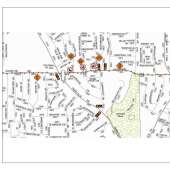The way to heart health may be through your stomach
Saturday, February 10, 2018

What keeps people from eating a heart healthy diet? There can be many individual factors, but Raina Childers, MS, RD, LD at HealthPoint Fitness, cites three major obstacles: the drive for convenience, conflicting information and portion distortion.
Because being busy can lead consumers to grab stuff of lower nutritional quality that can be consumed quickly, Childers advises planning ahead on the weekend — making a menu, shopping and getting a few meals prepped. By following this suggestion, she said, “When you are exhausted after work on Wednesday, you aren’t tempted to order pizza instead of making a healthy meal.”
Childers suggests doing research before going out to eat as a way of making better choices, pointing out that most restaurants will let customers request modifications or substitutions, as well as letting couples split a plate.
Childers notes that while the internet has given people access to an amazing amount of information, “a great deal of what is out there on nutrition is inaccurate.” She said people get frustrated when a new study contradicts what was previously thought to be a gold standard.
For example, many people grew up thinking eggs were part of a healthy breakfast; then, in the 1980s, experts reported eggs were a source of deadly cholesterol; now people are being told eggs are a good source of protein. Frustrated consumers may want to throw their hands up and just eat whatever they want. However, Childers suggests looking at Eatright.org or choosemyplate.gov for reliable nutrition information that won’t overwhelm.
Childers has discovered that sometimes people read a headline that touts a food’s health benefits and think, “If a handful of nuts is good for my heart, wouldn’t a whole jar of cocktail peanuts be even better?”
She then breaks it to them that there are no magic foods. And when it comes to nuts, too many calories and too much salt will increase weight and raise blood pressure.
Childers encourages focusing on weight loss or maintenance rather than trying to find a miracle item to add to your diet. That process starts with tracking what you currently eat. If you don’t know what you are doing, she observes, “it’s hard to make changes.” You need to look for patterns and trends, and, Childers reminds, “Don’t forget to count those M&Ms you grab each time you pass your co-worker’s desk.” Those looking to adopt a healthier diet should also measure portion sizes at first. According to Childers, most people are “notorious for underestimating how much we are eating.” Pour the amount of breakfast cereal you would usually put into your bowl in a measuring cup instead. Compare that amount to the listed serving size on the box. After that reality check, you will become better at eyeballing how much a serving size really is.
Childers encourages people in the pursuit of heart health to not become fixated on achieving an ideal Body Mass Index (BMI): “that should be viewed as a screening tool.”
Instead, she would rather see people heed The National Blood, Heart & Lung Institute’s finding that a person’s health can be greatly improved by just a loss of 5 to 10 percent of his or her starting weight.
SoutheastHEALTH hosts a monthly heart healthy cooking classes at HealthPoint Plaza. To learn more, call (573) 986-4440. Childers can be reached at rchilders@sehealth.org.
Pertinent address: 2126 Independence St, Cape Girardeau, MO 63703
































